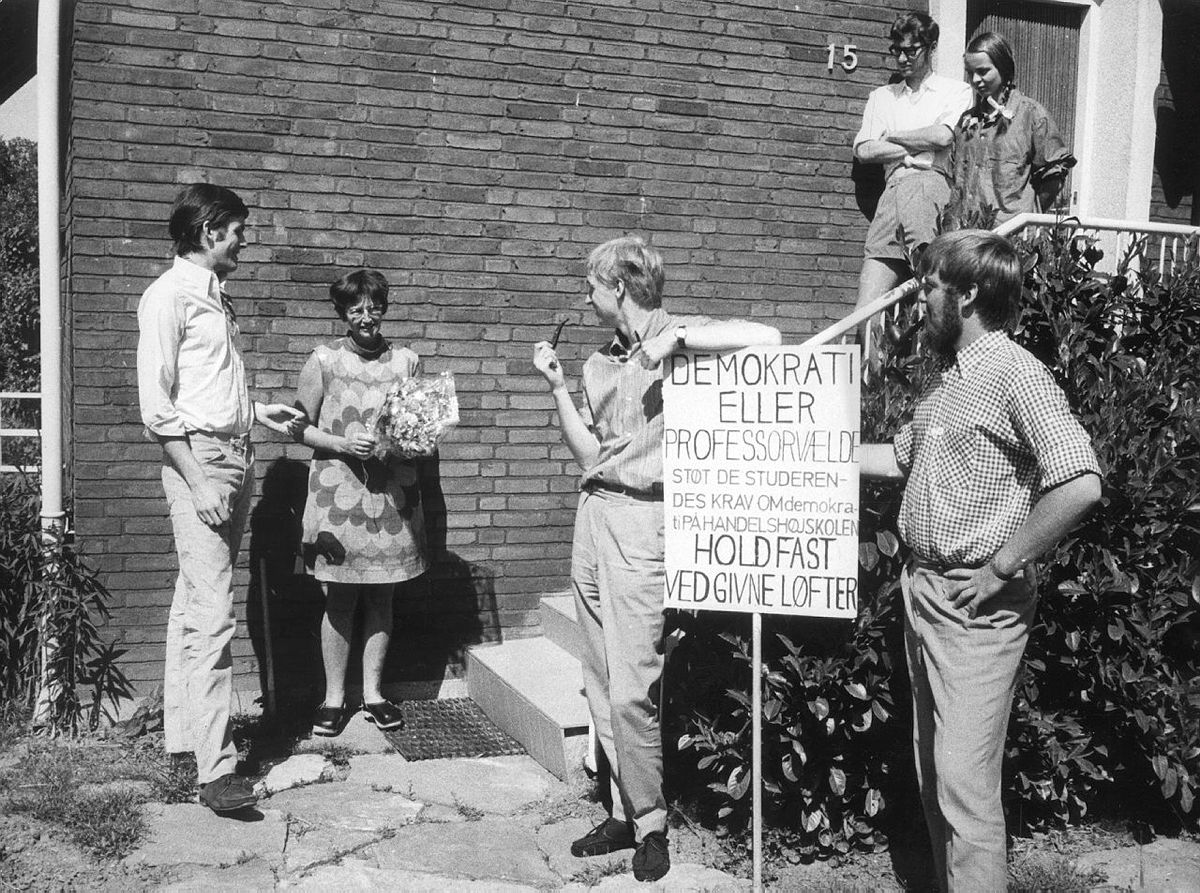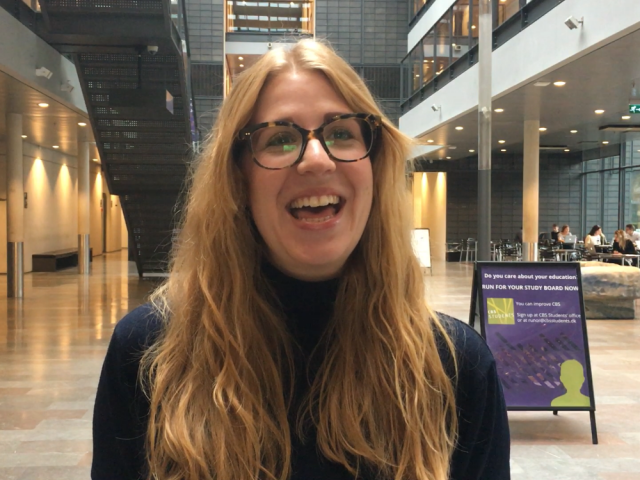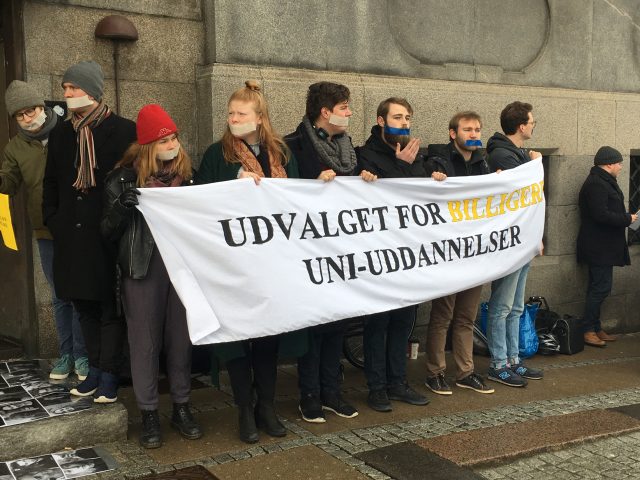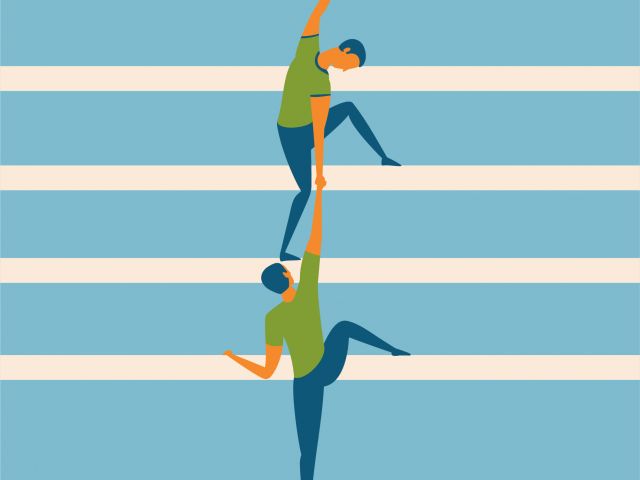Hooray: 50 years of student influence

Students of CBS demonstrating outside of Jan Kobbernagel's - the President of CBS - home, during the student rebellion in 1968. However, the president wasn't home at the time. (Copyright: Jørn Albertus)
The student rebellion of 1968 paved the way for student influence at CBS. But now an increased centralization of power can threaten the students’ say on things, according to the President of CBS Students. The opinions and influence of students “ensures the highest possible standards for education,” he argues.
In 1968, Danish students had had enough of professorial power. They wanted to have an influence on their education and how the universities were run. After much criticism over a long period, which reached its climax with the occupation of the University of Copenhagen in May, the students got what they wanted.
Fifty years on, Danish students have grown rapidly in number, as have their opinions and influence.
I set up an interview with Jeppe Ask Tofteskov, the President of CBS Students, to talk about how the students at CBS have used their influence, why student influence is important, and what would happen if students didn’t have any influence?
And then Jeppe Ask Tofteskov needs to explain why students are gradually losing influence, despite being represented and involved in initiatives, task forces, councils and boards.
Right now, the students at CBS can sign up and run to become members of their study boards, the Academic Council and the Board of Directors. In total, 95 places need to be filled.
“Working closely with students and asking for their opinions is a way to ensure the highest possible standards for education. Students are the lifeblood of CBS are therefore a natural part of the collaboration with senior management,” says Jeppe Ask Tofteskov, the President of CBS Students.
When it comes to student influence, it’s the study boards that are the most significant bodies. Here the students, together with the rest of the board, discuss the curricula, subjects, formats of exams, teaching and the courses approved for exchange.
And the study boards actually have the ability to change quite a number of things and put pressure on the senior management if bigger changes are needed, explains Jeppe Ask Tofteskov.
“At CBS Students, we have pushed to get more feedback, as the students at CSB are generally dissatisfied with the level of feedback. The study boards have supported this as well, and senior management has now agreed to run some pilot projects on this,” he says.
Apart from the study boards, the students also have two seats on the Academic Council and one seat on the Board of Directors.
The students on the Academic Council are there in an advisory capacity, where they discuss topics relevant to how CBS is run, whereas the Board of Directors seat has more power to decide things.
However, it has not always been like that, explains Jeppe Ask Tofteskov.
“Back in the day, the Academic staff and students had more power, as it took part in electing senior management and the president of CBS. It was more democratic. So, in that way, influence has been removed,” he says.
Today, CBS students are involved in several councils, like the Council for Inclusion and Diversity and the Partnerships Council. And students are asked to get involved in task forces, such as the SDG Task Force and the task force for a better study environment.
But student influence is still threatened, argues Jeppe Ask Tofteskov and refers to a council set up by the Ministry of Higher Education and Science, which is looking into the effect of study boards and the possibility of reducing their influence.
“Overall, power has been removed from the students and it has been given to the president,” he says.
But is that a problem?
“If the power is increasingly centralized, we could, in the end, lose the uniqueness of the different programs. Let me give you an example,” he says.
Jeppe Ask Tofteskov explains that when he studied for the BSc in Business Administration and Sociology, he liked the fact that the accounting part was divided into classic accounting and the sociology of accounting.
“That made a lot of sense to me and helped to make a really good connection with my studies. The senior management could argue that one standard accounting subject would suffice for everyone, but that would be such a shame and make the programs less unique,” he says.
If the students lost their influence on their study programs, it would be just up to the scientific personnel to ensure the quality of the programs. And that would be problematic, argues Jeppe Ask Tofteskov.
“It would be a very one-sided opinion. However, this is not where we are going, I believe. We have to look at the collaboration between the students, staff and management as a creative process, which aims to make CBS an even better place to study. And you can’t do that with a top-down approach,” says Jeppe Ask Tofteskov.
Jeppe Ask Tofteskov is excited about the different initiatives the study boards are involved in to improve their individual programs, and he thinks the study boards are best suited to that task.
“The Study boards have much more flexibility to initiate projects, for example the grade-free first year. If the Dean’s office had to do that, it would likely have taken longer to initiate,”says Jeppe Ask Tofteskov and encourages students to sign up and run for their study boards, the Academic Council and the Board of Directors.
“Run because you care about your study environment and think that student influence is important. And remember that being on a study board, the Academic Council or the Board of Directors is a really great opportunity to use what you’ve learned here at CBS,” he says.



































































































































Comments